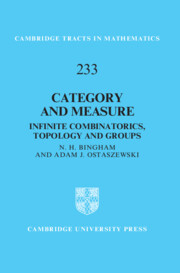Book contents
- Frontmatter
- Dedication
- Contents
- Preface
- Prologue: Regular Variation
- 1 Preliminaries
- 2 Baire Category and Related Results
- 3 Borel Sets, Analytic Sets and Beyond: Δ21
- 4 Infinite Combinatorics in Rn: Shift-Compactness
- 5 Kingman Combinatorics and Shift-Compactness
- 6 Groups and Norms: BirkhoffKakutani Theorem
- 7 Density Topology
- 8 Other Fine Topologies
- 9 CategoryMeasure Duality
- 10 Category Embedding Theorem and Infinite Combinatorics
- 11 Effros’ Theorem and the Cornerstone Theorems of Functional Analysis
- 12 Continuity and Coincidence Theorems
- 13 * Non-separable Variants
- 14 Contrasts between Category and Measure
- 15 Interior-Point Theorems: Steinhaus–Weil Theory
- 16 Axiomatics of Set Theory
- Epilogue: Topological Regular Variation
- References
- Index
9 - CategoryMeasure Duality
Published online by Cambridge University Press: 14 January 2025
- Frontmatter
- Dedication
- Contents
- Preface
- Prologue: Regular Variation
- 1 Preliminaries
- 2 Baire Category and Related Results
- 3 Borel Sets, Analytic Sets and Beyond: Δ21
- 4 Infinite Combinatorics in Rn: Shift-Compactness
- 5 Kingman Combinatorics and Shift-Compactness
- 6 Groups and Norms: BirkhoffKakutani Theorem
- 7 Density Topology
- 8 Other Fine Topologies
- 9 CategoryMeasure Duality
- 10 Category Embedding Theorem and Infinite Combinatorics
- 11 Effros’ Theorem and the Cornerstone Theorems of Functional Analysis
- 12 Continuity and Coincidence Theorems
- 13 * Non-separable Variants
- 14 Contrasts between Category and Measure
- 15 Interior-Point Theorems: Steinhaus–Weil Theory
- 16 Axiomatics of Set Theory
- Epilogue: Topological Regular Variation
- References
- Index
Summary
The close parallels – duality – between category and measure go back to Sierpiński in the 1920s. The Sierpiński–Erdős duality principle (see Oxtoby, Ch. 19) gives full duality under the Continuum Hypothesis, CH (see Chapter 16). An unconditional example of duality is the Poincaré recurrence theorem from statistical mechanics. So is the zero–one law of probability theory; duality does not extend as far as its quantitative versions, the strong law of large numbers and the ergodic theorem. Also discussed are: uniqueness theorems for trigonometric series; the Cauchy functional equation; the Steinhaus dichotomy – for S Baire and non-meagre (or measurable and non-null), the difference set S - S contains an interval around the origin (the dichotomy being that this may fail for meagre/null sets). Combinatorial principles are relevant here – Jensen’s Diamond and Ostaszewski’s Club are here augmented by a third, No Trumps, NT, a common generalization of the Baire and measurable cases.
Keywords
- Type
- Chapter
- Information
- Category and MeasureInfinite Combinatorics, Topology and Groups, pp. 137 - 160Publisher: Cambridge University PressPrint publication year: 2025

